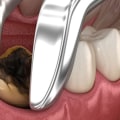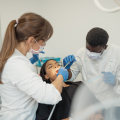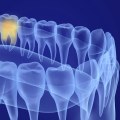If you're feeling anxious about an upcoming tooth extraction, it's important to remember that it's a common, simple and painless procedure. A good dentist will always provide some level of pain relief so that the experience isn't too uncomfortable. One of the most common ways dentists relieve pain is by using nitrous oxide, also known as laughing gas. This anesthetizes the nerve fibers that transmit pain signals, so you won't feel any pain.
However, you may experience a feeling of pressure during the procedure. It's normal and shouldn't cause discomfort, but it's good to be aware of what to expect. You may also hear loud noises during the extraction, which can be unpleasant. To make the experience more comfortable, consider bringing headphones and listening to music while your tooth is being removed.
In some cases, a tooth extraction may be necessary due to infection or damage. If your immune system is compromised, even the risk of infection in a particular tooth may be reason enough to extract it. To ensure that you don't feel any pain during the procedure, your dentist will numb the area with a local anesthetic before beginning the extraction. Nitrous oxide may not be strong enough for more serious extractions, so oral sedatives are often used instead.
This is stronger than nitrous oxide and should eliminate any pain. Most patients who require emergency extractions go directly to the emergency room. However, hospitals typically only administer painkillers and refer them to their dentist, as they are not equipped for that type of work. Wisdom tooth extractions are usually done with anesthesia to make the experience as comfortable as possible.
Dentists and oral surgeons (dentists with special training to perform surgery) perform tooth extractions. Tooth decay or damage can spread to the pulp (the center of the tooth containing nerves and blood vessels). If this happens, bacteria from the mouth can enter the pulp and cause infection. In this case, tooth extraction is necessary to prevent further damage and infection.






